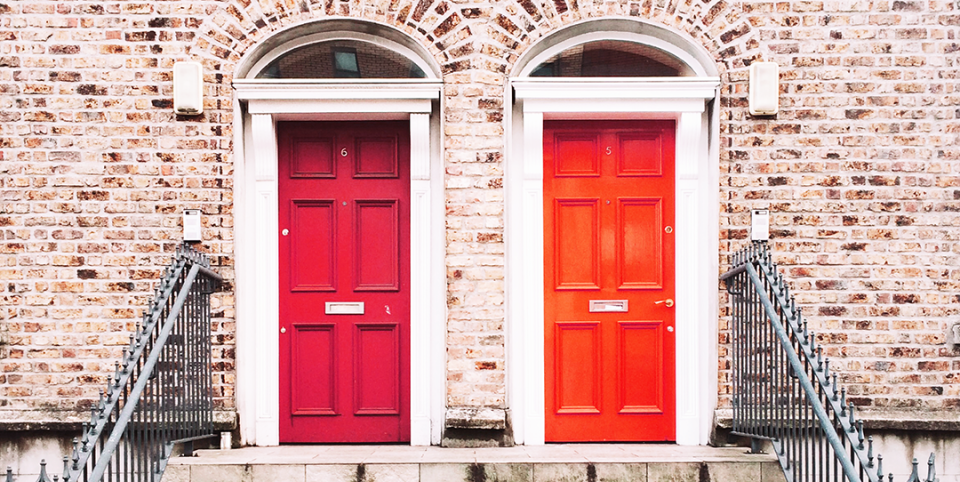You Could Live in Your House for Free If You Follow the Rules of "House Hacking"

There's no way around it: Buying a house is expensive. In fact, the average home in the U.S. costs just over $244,000, per Zillow's latest findings. That's why many people — first-time buyers, especially — are turning to "house hacking" to cut back on upfront costs. It's a real estate trend that's growing out of necessity, since many people find themselves living in cities where they are simply priced out of home buying. Read on to learn the ins and outs of house hacking, including if it's a smart option for you.
So, what is house hacking?
The phrase itself was coined by BiggerPockets podcast host Brandon Turner. He describes house hacking as the practice of "combining your investment property with your personal residence." Although you can technically do this with any single-family home, house hacking is typically done with small, multi-family properties like duplexes, triplexes, or any properties with divisible living spaces. That way the owners can live in one unit while renting the other units to tenants. House hacking, simply put, “is renting out a portion of your primary residence to generate income to offset the cost of the cost of the mortgage and other costs associated with the home,” says CPA Paul Miller.
Though house hacking may be uber-buzzy right now, the concept is hardly new in practice. "In earlier times, a simple example would be buying a mother-daughter house — you live upstairs and rent downstairs," Miller explains. The modern-day version achieves the same goal: It's an easy, low-stakes way to buy into a housing market you otherwise couldn’t afford.
How does house hacking let you live for free?
If done effectively, house hacking can actually let you live for free, making your investment well worth it. Think of it this way: After you buy a duplex or triplex, and put some money into fixing it up, you’ll also have a range of bills and everyday expenses to pay each month, including a mortgage, taxes, insurance, and utilities. But when you bring in tenants to offset monthly costs, your own portion of that bill may be close to zero — or possibly, cash-flow positive. At the same time, living in a hacked home helps you save money on built-in expenses — electricity, internet, and gas bills, especially — since there are more people to split the total cost.
The biggest money-saver? House hacking reduces your taxable income. In other words, owning a property gives you a mortgage interest deduction, saving you a significant amount each tax season.
Thinking bigger, this method allows to eventually move out (if that's your end goal, of course) and let another tenant live in your old unit. That way you can generate more money monthly and keep investing in bigger, better properties.

Is house hacking a good idea for first-time buyers?
Since first-time buyers typically have less money to spend upfront, Turner recommends house hacking as a solid, sensible place to start — as long as you have enough money set aside for the down payment. While "no down payments" mortgages aren't as common today, there are plenty of ways to purchases homes with low down payments, ranging from 3.5% down for FHA loans to 20% down for more conventional mortgages. If you're not sure where to start, talk with qualified mortgage professionals at your bank to ensure that you make the right decision for you.
Beyond that, house hacking teaches you the ins and outs of being a landlord. Because you live on site, you can quickly address tenants' concerns and keep your eyes on the property at all times. It also allows you to handle any maintenance or repairs as quickly as possible, preventing further damage.
What do you need to know before you try house hacking?
First, you need to make sure you're investing in a property that can easily be hacked — several rooms and entry points, desirable location, and feasible cost. "You have to know the rental market of the area you are looking to buy, the ability to re-rent," Miller explains.
Once you find a property that checks all the boxes, it's time to establish the rental fee for tenants. Turner suggests following the 50% rule of thumb:
Take the total cost of a property and divide it in half to estimate your expenses.
After deducting your loan payment, the remaining money is your estimated cash flow a.k.a. the amount of money you should be charging for rent.
Of course, take into account emergencies like leaking ceilings or piping disasters.
And you need to be aware of the risks. “In case of a lost tenant, do you have the cash flow to carry the vacancy?” Miller says. With that being said, he urges looking into how short-term-rental rules, such as for Airbnbs, may or may not apply to your target situation and specific goals. You need to know: "Am I allowed to rent my space for less than 30 days?"
All in all, Miller recommends house hacking for a certain type of investor and personality. But go into it with eyes wide open. “Owning a house comes with a lot of baggage, repairs, and complaints,” he cautions. Because no matter how hard you try, you can't prevent the unexpected from happening.
For can't-miss news, expert beauty advice, genius home solutions, delicious recipes, and lots more, sign up for the Good Housekeeping newsletter.
You Might Also Like

